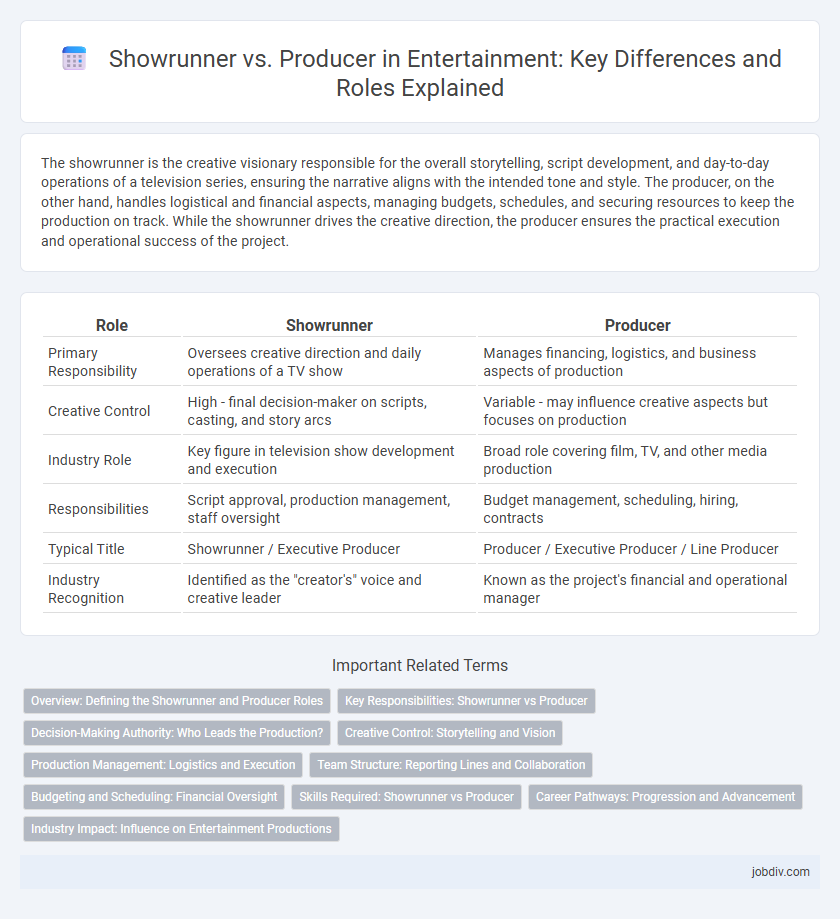The showrunner is the creative visionary responsible for the overall storytelling, script development, and day-to-day operations of a television series, ensuring the narrative aligns with the intended tone and style. The producer, on the other hand, handles logistical and financial aspects, managing budgets, schedules, and securing resources to keep the production on track. While the showrunner drives the creative direction, the producer ensures the practical execution and operational success of the project.
Table of Comparison
| Role | Showrunner | Producer |
|---|---|---|
| Primary Responsibility | Oversees creative direction and daily operations of a TV show | Manages financing, logistics, and business aspects of production |
| Creative Control | High - final decision-maker on scripts, casting, and story arcs | Variable - may influence creative aspects but focuses on production |
| Industry Role | Key figure in television show development and execution | Broad role covering film, TV, and other media production |
| Responsibilities | Script approval, production management, staff oversight | Budget management, scheduling, hiring, contracts |
| Typical Title | Showrunner / Executive Producer | Producer / Executive Producer / Line Producer |
| Industry Recognition | Identified as the "creator's" voice and creative leader | Known as the project's financial and operational manager |
Overview: Defining the Showrunner and Producer Roles
The showrunner serves as the chief creative authority, overseeing the writing, production, and overall vision of a television series, often acting as the head writer and executive producer. Producers manage various business and logistical aspects, including budgeting, scheduling, and coordinating between departments to ensure smooth production. While the showrunner drives the creative direction, producers focus on operational and financial execution, making both roles essential for successful entertainment production.
Key Responsibilities: Showrunner vs Producer
The showrunner holds the ultimate creative authority on a television series, overseeing script development, casting decisions, and the overall vision to maintain narrative consistency. Producers manage logistical aspects such as budgeting, scheduling, and coordination between departments to ensure production efficiency. While the showrunner drives artistic direction, producers focus on operational execution, making both roles essential for successful show production.
Decision-Making Authority: Who Leads the Production?
The showrunner holds primary decision-making authority in a television production, overseeing creative directions, script approvals, and day-to-day operations to maintain the show's vision and consistency. Producers manage logistical elements such as budgeting, contracts, and scheduling, supporting the production's overall framework but deferring to the showrunner on narrative and artistic choices. This division establishes the showrunner as the creative leader, while producers facilitate the production's organizational and financial execution.
Creative Control: Storytelling and Vision
Showrunners hold primary creative control over the storytelling and vision of a TV series, guiding script development, character arcs, and thematic direction. Producers typically oversee logistical aspects, such as budgeting and scheduling, with less influence on creative decisions. The showrunner's role is crucial in maintaining narrative consistency and artistic integrity throughout the production.
Production Management: Logistics and Execution
Showrunners oversee the creative vision and manage the overall production, ensuring scripts, casting, and post-production align with the series' narrative goals. Producers handle the logistical aspects, including budgeting, scheduling, resource allocation, and coordination between departments to maintain project timelines and financial efficiency. Effective production management balances the showrunner's creative directives with the producer's operational control to achieve seamless execution on set.
Team Structure: Reporting Lines and Collaboration
Showrunners serve as the creative visionaries, overseeing writers, directors, and editors to maintain narrative consistency, while producers manage the logistical and financial aspects of production, coordinating with line producers, department heads, and talent. The showrunner typically reports to network executives or studio heads, ensuring the creative direction aligns with business goals, whereas producers report to executive producers or studio leadership, focusing on budgets and schedules. Collaboration between showrunners and producers is essential, with clear reporting lines fostering efficient communication and unified team efforts across creative and operational departments.
Budgeting and Scheduling: Financial Oversight
Showrunners manage budgeting and scheduling by maintaining creative control while ensuring financial plans align with the show's vision. Producers focus more on the overall financial oversight, negotiating contracts, and allocating resources efficiently to meet production deadlines. Both roles collaborate closely to balance artistic goals with budget constraints and timely delivery.
Skills Required: Showrunner vs Producer
Showrunners require strong leadership, scriptwriting expertise, and comprehensive understanding of the television production process to ensure creative vision and narrative cohesion. Producers need excellent project management skills, budget oversight, and the ability to coordinate logistics across departments to deliver the show on time and within budget. Both roles demand effective communication, problem-solving abilities, and collaboration with cast and crew to execute a successful entertainment production.
Career Pathways: Progression and Advancement
Showrunners often begin their careers as writers or assistant producers, gradually advancing through roles such as staff writer, story editor, and executive producer before taking on full creative control of a series. Producers typically start in entry-level positions like production assistant or associate producer, gaining experience in budgeting, scheduling, and logistics to move up to line producer, co-producer, and executive producer roles. Career progression for showrunners emphasizes creative leadership and narrative vision, whereas producers advance by mastering operational management and financial oversight within the entertainment industry.
Industry Impact: Influence on Entertainment Productions
Showrunners shape the creative vision and narrative direction of television series, directly influencing storytelling quality and audience engagement, while producers manage logistical, financial, and operational aspects that ensure project feasibility and successful execution. Their combined impact drives industry standards in content development, production efficiency, and viewer satisfaction, establishing new benchmarks for television innovation. The synergy between showrunners and producers plays a crucial role in shaping entertainment production trends and determining market success.
Showrunner vs Producer Infographic

 jobdiv.com
jobdiv.com